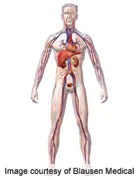New therapy may combat amyloidosis, the potentially deadly disease caused by protein build-up in organs
WebMD News from HealthDay

By Dennis Thompson
HealthDay Reporter
THURSDAY, Aug. 29 (HealthDay News) -- A new medication appears to be highly effective in combating a heredity-based form of the organ-damaging genetic disorder known as amyloidosis, according to researchers.
Amyloidosis refers to a family of more than a dozen diseases in which different types of abnormal proteins called amyloids lodge in major organs and nerves. These amyloids build up to the point that they cause damage and, ultimately, organ failure.
The new therapy caused a marked decline in blood-borne levels of an amyloid protein called transthyretin, or TTR, in 32 patients suffering from amyloidosis during one of the two Phase I drug trials, said the study's co-author, Dr. Akshay Vaishnaw, chief medical officer for Alnylam Pharmaceuticals, which developed the medication and funded the trials.
"We can dramatically reduce the levels of TTR protein," Vaishnaw said. "In fact, we can reduce them by 94 percent. One shot a month will produce this reduction."
The study findings are published in the Aug. 29 issue of the New England Journal of Medicine.
Amyloidosis is a very rare disease. Between 1,500 and 2,500 Americans a year are diagnosed with AL amyloidosis, the disorder's most common form, according to Harvard Medical School. Heredity-based forms of amyloidosis, most of which are related to transthyretin, are even rarer.
People suffering from TTR amyloidosis eventually become wheelchair-bound as the buildup of abnormal proteins along the nerves causes painful neuropathy in their arms and legs, Vaishnaw said. Transthyretin amyloids also lodge in the heart, causing heart disease that can lead to irregular heartbeat and heart failure.
Nearly all transthyretin amyloids are produced by the liver and, up to now, liver transplant has been the only effective treatment for TTR amyloidosis, Vaishnaw said.
The new medication -- tested in the trials in two versions, called ALN-TTR01 and ALN-TTR02 -- is delivered via an intravenous infusion and works by inhibiting the genetic process that prompts the creation of transthyretin. Blocking transthyretin production in the liver causes blood levels of the amyloid to drop.
The drug produced no major side effects in the patients tested, Vaishnaw said, noting that one patient did suffer an infusion reaction unrelated to the drug.
"This is a very exciting report, but it's also a very early report," said Dr. Raymond Comenzo, director of the Blood Bank and Stem Cell Processing Laboratory at Tufts Medical Center in Boston. "There was clear-cut evidence of safety and of effectiveness in reducing circulating levels of transthyretin."
However, more research will need to be done to show that the drug not only reduces TTR amyloid levels but also helps improve amyloidosis symptoms in patients, Comenzo added.
"One has to wonder what the road ahead is, how will the clinical development process work its way out," Comenzo said. "The [U.S. Food and Drug Administration] is going to want to see a benefit that's measured in terms more than just levels of circulating TTR."
source : Experimental Drug Shows Promise for Rare Genetic Disorder








